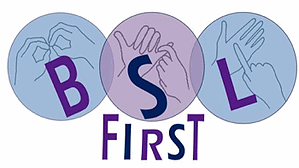Qualification aim
The Signature Level 6 Diploma in Sign Language Interpreting and Translation (RQF) qualification aims to provide aspiring signed language interpreters and translators with the essential knowledge, understanding and skills for a career in the signed language interpreting and translation professions.
Qualification objectives
At the end of this qualification candidates will be able to:
- demonstrate good practice in their area of professional activity
- demonstrate their ability to carry out interpreting assignments to a professional standard
- be fully aware of the role of the professional interpreter and the principles of professional practice
- evaluate and reflect on performance
- promote personal and professional development.
Qualification structure
This qualification is designed to give the candidate the flexibility to specialise in 1 or more of the 4 areas of practice covered by this qualification.
The learning objectives and assessment criteria that make up this qualification are based on the National Occupational Standards for interpreting (CFAINT) and translation (CFAPTra) (Instructus 2017).
The qualification is in 2 parts. In order to complete this qualification, candidates must complete Part 1 and at least one stream in Part 2.
